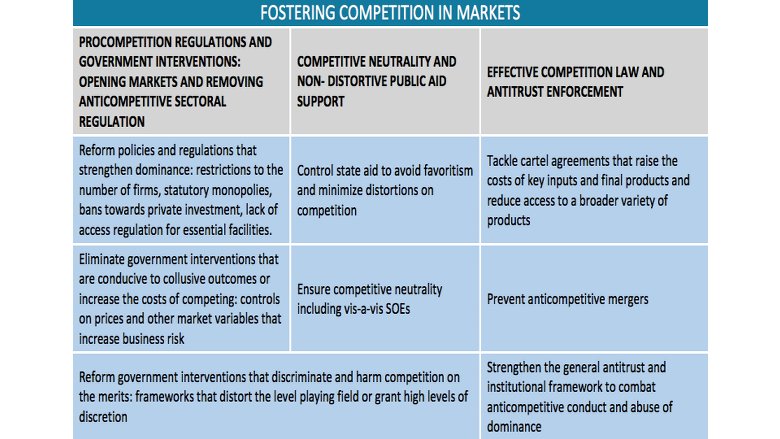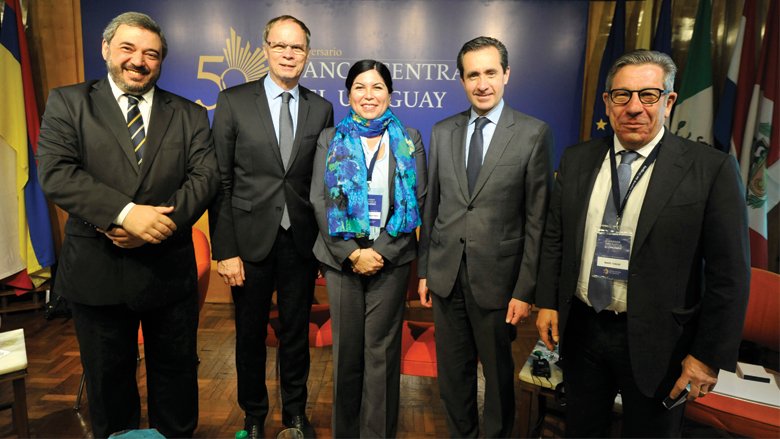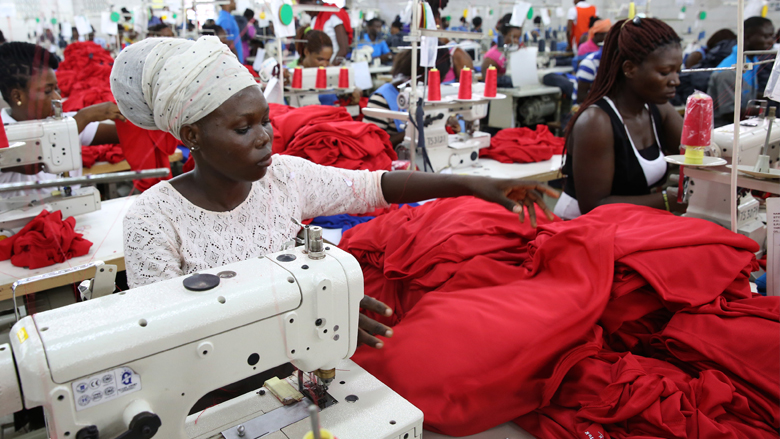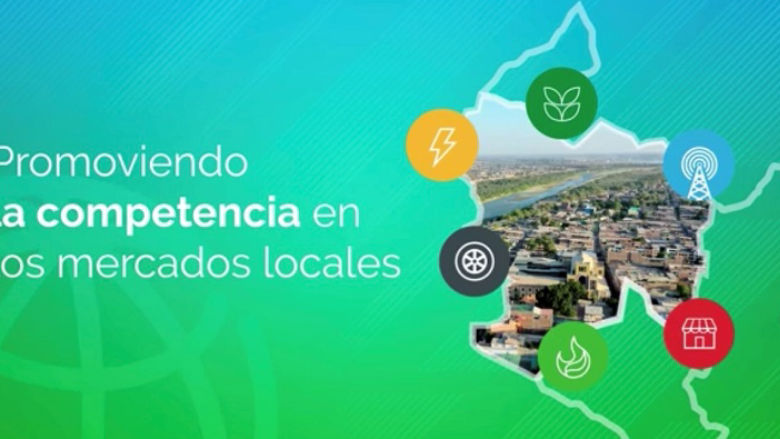Competition fosters economic welfare and makes markets work for development. The World Bank Group supports clients in promoting and implementing pro-competition rules in key sectors, deterring anticompetitive business practices, and minimizing distortive government interventions in markets.
Overview
Many markets in developing countries do not yet benefit fully from healthy and effective competition, and government interventions often fail to provide firms with the right incentives to compete. At the regional, national, and subnational levels, sector-specific rules and regulations frequently limit market entry or reinforce the dominance of a few firms. Although more than 100 countries have enacted competition laws, anticompetitive practices continue, especially in developing countries. Regulatory frameworks often fail to ensure that more efficient market players can compete on a level playing field. State-owned enterprises (
Anticompetitive business practices have been detected in various markets that are important for a country’s overall competitiveness and poverty alleviation. Cartels, which increase prices in affected goods and services by at least 20 percent, have been found in markets such as fertilizer, cement, and transportation services. Staple consumer products such as bread and sugar, and critical financial services ranging from electronic payment systems to insurance, cost consumers more due to cartels and abuse of dominance. Bid rigging in public procurement is prevalent in construction, transportation, and health sectors.
Strategy
The Markets and Competition Policy cluster of the World Bank Group
- Designing pro-competition market regulation. Opening specific markets to competition, reducing government interventions that may shelter less efficient firms, protect incumbents or facilitate collusion, including sector-specific regulatory design.
- Embedding competition principles in broader public policies. Implementing effective competition advocacy strategies, national competition policies, state aid, and infusing competition principles in regulatory reforms.
- Reforming the competition framework and its implementation. Design of anticartel programs (including leniency), merger control, market and competition analysis techniques, institutional effectiveness of competition authorities, and advocacy strategies across government agencies.
- Fostering competitive neutrality in markets with direct state participation. Designing mechanisms that minimize the distortive effects of incentives and state aid support and promote competitive neutrality among market players
Building upon the World Bank Group Markets and Competition Policy Assessment Tool (
Results
Market and competition reforms foster efficient regulatory frameworks in key sectors, deter anticompetitive business practices, and minimize distortive government interventions in markets. Such reforms improve market contestability, lead to
In Kenya, the World Bank Group is advising the government on competition regulations that will break up cartels in key economic sectors. With the enactment of these regulations, anticompetitive agreements will be prohibited and removed, generating private savings for firms and households. Estimates indicate savings of about $18 million annually in insurance markets alone. In addition, sector-specific work in agribusiness has helped unlock key markets that were closed to private investment because of statutory state monopolies. We are helping stakeholders draft bylaws that will allow private participation in previously monopolized markets.
In the Philippines, the World Bank Group has helped implement reforms that dramatically cut the time needed to register new vessels. One result is that incumbent operators are no longer able to prevent new companies from serving certain routes. This translates into a potential 5 percent savings in transport logistics costs.
By promoting equal treatment for firms seeking to register for agriculture inputs, the World Bank Group helped Honduras more than triple the amount of products registered per year and decreased the prices of some pesticides by as much as 9 percent.
RELATED PUBLICATIONS:
Promoviendo Competencia en Mercados Locales en el Perú: Piloto en Piura (Spanish)
Design for Impact: A State Aid Evaluation in Romania
Corporate Market Power in Romania
License to Compete : Reforming the Regulation of Professions in Croatia
New Growth Agenda Removing Regulatory Barriers to Competition in Serbia
Markets and People : Romania Country Economic Memorandum
Sénégal: de meilleurs marches pour tous grâce à la politique de la concurrence (Français)
Moldova: Rekindling Economic Dynamism
Chad – Escaping Chad’s growth labyrinth
Senegal - Better Markets for All through Competition Policy (English)
Fostering Competition in the Philippines: The Challenge of Restrictive Regulations
A Step Ahead: Competition Policy for Shared Prosperity and Inclusive Growth
Transforming Markets through Competition: New Developments and Recent Trends in Competition Advocacy
Breaking down barriers : unlocking Africa's potential through vigorous competition policy
Tunisia - Opening markets: Creating an Environment for Investment and Job Creation
Building Landmarks, Smoothing out Markets: An Enhanced Competition Framework in Romania
Namibia - Boosting Investment and Well- Functioning Markets: A Competition Policy Approach
Republic of Armenia : Accumulation, Competition, and Connectivity
Competition in Kenyan markets and its impact on income and poverty: a case study on sugar and maize
Services in the European Union: What Kinds of Regulatory Policies Enhance Productivity?
EXTERNAL PUBLICATIONS
Unlocking Growth Potential In Kenya
Combating Cartels in Developing Countries: Implementation Challenges on the Ground
Cartel Exemptions in Developing Countries: Recent Work from the World Bank Group









